
PAKISTAN JOURNAL OF ZOOLOGY
Scope & Guideline
Innovating animal biology insights from Pakistan and beyond.
Introduction
Aims and Scopes
- Animal Physiology and Biochemistry:
Research focusing on the physiological and biochemical processes in animals, including studies on metabolic pathways, hormonal regulation, and physiological adaptations to environmental changes. - Ecology and Conservation Biology:
Studies that explore the ecological dynamics of animal populations, their habitats, and the impacts of human activities on biodiversity, along with conservation strategies for endangered species. - Veterinary and Animal Health Sciences:
Research addressing animal health issues, including disease prevention, diagnosis, treatment, and the impact of diseases on livestock and wildlife. - Genetics and Molecular Biology:
Investigations that delve into the genetic diversity, population genetics, and molecular mechanisms underlying various traits in animal species, often utilizing advanced genomic techniques. - Entomology and Pest Management:
Research focused on insect behavior, ecology, pest management strategies, and the interactions between insects and their environment, particularly in agricultural contexts. - Aquatic Biology and Fisheries:
Studies related to freshwater and marine ecosystems, fish biology, aquaculture practices, and the management of aquatic resources. - Zoological Taxonomy and Systematics:
Research contributing to the classification, identification, and phylogenetic analysis of animal species, including new species descriptions and revisions of existing taxa.
Trending and Emerging
- Climate Change Impact Studies:
An emerging focus on how climate change affects animal behavior, distribution, and physiology, reflecting global concerns about environmental changes. - One Health Approach:
A growing trend to integrate human, animal, and environmental health research, addressing zoonotic diseases and their transmission pathways. - Genomic and Molecular Research:
An increase in studies utilizing genomic technologies to explore genetic diversity, disease resistance, and evolutionary biology in various species. - Conservation Genetics:
Rising interest in conservation genetics, particularly in understanding the genetic diversity of endangered species and the implications for conservation strategies. - Sustainable Aquaculture Practices:
Emerging research on sustainable practices in aquaculture, focusing on improving fish health, optimizing feed efficiency, and reducing environmental impacts. - Biodiversity Assessment Technologies:
The use of advanced technologies such as environmental DNA (eDNA) analysis and remote sensing to assess biodiversity and monitor wildlife populations.
Declining or Waning
- Traditional Wildlife Studies:
There has been a noticeable decrease in studies focusing solely on traditional wildlife observation and behavior, possibly due to a shift towards more applied conservation and ecological research. - Invertebrate Zoology:
Research on invertebrates, while still important, appears to be less frequently published compared to vertebrate studies, indicating a potential waning interest in this area. - Taxonomic Studies of Common Species:
Taxonomic research on well-known species may be declining as researchers focus on more novel or threatened species, reflecting a trend towards conservation priorities. - Ecosystem Modeling Studies:
The prevalence of theoretical and modeling studies in ecosystem dynamics may be decreasing in favor of empirical research that provides direct observations and data.
Similar Journals

Zoological Letters
Fostering innovation in animal science and research.Zoological Letters, published by BMC, is a premier open-access journal dedicated to advancing the field of zoology and animal science. Since its inception in 2015, the journal has established itself as a critical platform for researchers to disseminate their findings and contribute to the ongoing discourse in this vibrant discipline. Based in the United Kingdom, Zoological Letters boasts an impressive Q2 category ranking in Animal Science and Zoology for 2023, placing it within the top 25% of journals in the field. With a Scopus rank of #116 out of 490, representing the 76th percentile, it showcases the influence and reach of the research published within its pages. The journal’s substantial focus on contemporary issues and methodologies ensures that it is a vital resource for academics, professionals, and students alike, fostering innovation and collaboration throughout the global scientific community. Open access since 2015, Zoological Letters is committed to making scientific knowledge accessible, thus enhancing the visibility and impact of research in zoological studies.

CONTRIBUTIONS TO ZOOLOGY
Fostering Collaboration in the World of ZoologyCONTRIBUTIONS TO ZOOLOGY, published by BRILL, is a premier scholarly journal dedicated to advancing the field of zoological sciences. With an ISSN of 1383-4517 and an E-ISSN of 1875-9866, this journal serves as a vital platform for researchers, professionals, and students seeking to share their findings and insights related to animal science, ecology, evolution, and systematics. Recognized for its high academic standards, it ranks in the top quartile (Q1) for Animal Science and Zoology, and Q2 for Ecology, Evolution, Behavior, and Systematics, reflecting its significance and influence in the scholarly community. The journal has been consistently published since 1994 and continues to contribute pivotal knowledge that informs and shapes contemporary zoological research. Researchers can access the journal through traditional subscription models, ensuring broad dissemination of its impactful articles and studies. Contributions to Zoology plays an essential role in fostering collaboration and discussion within the zoological community in the Netherlands and beyond.
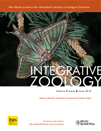
Integrative Zoology
Championing Excellence in Zoological SciencesIntegrative Zoology is a distinguished journal published by WILEY, focusing on advancing the field of zoological sciences through the integration of various biological disciplines. With both ISSN 1749-4877 and E-ISSN 1749-4869 identifiers, this journal features research that fosters a deeper understanding of animal biology, ecology, and conservation strategies. As a testament to its impact, Integrative Zoology is recognized within the Q1 category of Animal Science and Zoology in 2023, ranking an impressive #27 out of 490 journals in its field, placing it in the 94th percentile among peers. Published in the United Kingdom, this journal not only serves as a critical platform for novel research but also engages a global audience, inviting submissions that bridge theoretical and practical aspects of zoology. While not entirely open access, the journal remains committed to disseminating high-quality research that contributes substantially to scientific advancements. Through its continuous publication since 2008, Integrative Zoology aims to inspire researchers, educators, and students alike, making it a cornerstone for anyone passionate about the complexities of animal life.
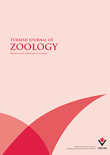
TURKISH JOURNAL OF ZOOLOGY
Bridging Research and Innovation in ZoologyThe TURKISH JOURNAL OF ZOOLOGY, published by the esteemed Tubitak Scientific & Technological Research Council Turkey, serves as a pivotal platform for the dissemination of research in the field of zoology and animal science. With an ISSN of 1300-0179 and an E-ISSN of 1303-6114, this journal has been contributing to the scientific community since its inception in 1994 and will continue to do so through 2024. Renowned for its scientific rigor, the journal holds a Q3 ranking in the 2023 category of Animal Science and Zoology, placing it within the prominent ranks of Scopus with a current percentile of 56, and an overall rank of 214 out of 490 in its domain. As an essential resource for researchers, professionals, and students, the journal prioritizes quality research, fostering knowledge exchange and collaboration among scholars worldwide. With its commitment to advancing understanding in zoological sciences, the TURKISH JOURNAL OF ZOOLOGY stands as a significant contribution to the global scientific dialogue.

Redia-Journal of Zoology
Unveiling the mysteries of the animal kingdom.Redia-Journal of Zoology, published by the CRA-Research Centre Agrobiology & Pedology in Italy, is a distinguished academic journal dedicated to advancing the field of zoological studies through high-quality research and insightful reviews. With an ISSN of 0370-4327, this journal provides a platform for scholars and practitioners in the Agricultural and Biological Sciences to disseminate their findings and engage in meaningful discourse. Recognized in the 2023 Scopus rankings as Q2 in its category, Redia occupies a notable position within the global research community, ranked 138 out of 221 in Agricultural and Biological Sciences. The journal has a commitment to publishing original research from 2011 until 2024, contributing to the body of knowledge in diverse sub-disciplines of zoology, ecology, and conservation. While currently not open access, Redia strives to foster collaboration and discussion among researchers, making it a vital resource for advancing zoological sciences.
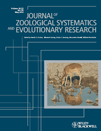
JOURNAL OF ZOOLOGICAL SYSTEMATICS AND EVOLUTIONARY RESEARCH
Exploring the Depths of Evolutionary InsightsThe Journal of Zoological Systematics and Evolutionary Research, published by Wiley-Hindawi, stands as a premier academic journal since its establishment, showcasing cutting-edge research in the fields of Animal Science, Zoology, and Ecology. With an impressive track record spanning from 1963 to the present, this journal has earned a Q1 classification in both Animal Science and Ecology, as well as recognized rankings in Genetics and Molecular Biology. Its impact is highlighted by its Scopus ranks, placing it in the top percentile for relevant categories, underscoring its vital role in advancing knowledge and understanding within these disciplines. Researchers, professionals, and students will find a wealth of high-quality, peer-reviewed articles that contribute to the evolutionary understanding of biodiversity and systematics. Though not an Open Access journal, it remains accessible to a wide audience committed to exploring the intricacies of zoology and evolutionary biology.
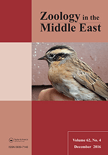
ZOOLOGY IN THE MIDDLE EAST
Exploring the Rich Fauna of the Middle EastZoology in the Middle East, published by Taylor & Francis Ltd, is a pivotal journal dedicated to advancing the field of zoological research with a distinct focus on the rich and diverse fauna of the Middle Eastern region. With its ISSN of 0939-7140 and an E-ISSN of 2326-2680, this journal has successfully carved out a niche for itself since its inception in 1986, covering topics of significant relevance to animal science and zoology, as evidenced by its Q2 ranking in the 2023 category quartiles. Although it operates as a subscription-based journal, it aims to disseminate high-quality research articles, reviews, and case studies that contribute to the understanding of animal biodiversity and conservation in the Middle East. With a Scopus ranking placing it in the 38th percentile of the agricultural and biological sciences category, Zoology in the Middle East serves as an essential resource for researchers, professionals, and students who seek to deepen their knowledge and appreciation of the region's zoological heritage. Scholarly contributions to this journal not only enhance scientific discourse but also inform conservation strategies and policy-making in an area that is critical to global biodiversity.

ZOOLOGICAL SCIENCE
Connecting Scholars to the Heart of Zoological ScienceZoological Science, published by the Zoological Society of Japan, is a leading journal dedicated to the fields of animal science and zoology. With its ISSN 0289-0003, this respected publication has established itself as a prominent source of scientific research, attaining a commendable Q2 ranking in the 2023 category of Animal Science and Zoology. Spanning over three decades, from 1992 to 2024, the journal offers a valuable platform for scholarly articles that explore various aspects of zoology, including ecology, behavior, and evolutionary biology. Although it operates under a traditional subscription model, its contributions are supported by a robust community of researchers and professionals who value its insights. The journal strives to foster academic discourse and insights that drive understanding and conservation of wildlife, making it an essential resource for students and established experts alike. The publishing headquarters located in Tokyo, Japan, further enhances its international reach and influence in zoological studies.

Journal of Vertebrate Biology
Innovating research in animal science and ecology.Journal of Vertebrate Biology, a reputable publication established by the Institute of Vertebrate Biology in the Czech Republic, serves as a vital platform for research across the fields of Animal Science and Zoology, Aquatic Science, and Ecology, Evolution, Behavior and Systematics. With its ISSN 2694-7684 and a commendable 2023 Q2 ranking in multiple categories, this open-access journal embraces innovative scientific inquiry and fosters academic discourse. The journal's commitment to disseminating high-quality research is reflected in its Scopus rankings, positioning it within the top quartile in several impactful areas. As it continues to converge its focus until 2024, researchers, professionals, and students alike are encouraged to engage with cutting-edge studies that advance our understanding of vertebrate biology. This publication stands out not only in its scholarly contributions but also in enhancing global awareness of biodiversity and conservation issues.
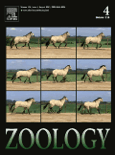
ZOOLOGY
Advancing the frontiers of animal science.ZOOLOGY, an esteemed journal published by Elsevier GmbH, stands at the forefront of research in the Animal Science and Zoology fields. With a notable impact factor and recognized as a Q1 category journal in its discipline, ZOOLOGY is highly regarded among researchers, ranking #98 out of 490 in Scopus rankings. Founded in 1994 and continuing through to 2024, the journal aims to publish cutting-edge, peer-reviewed articles that contribute significantly to the understanding of zoological sciences. Based in Munich, Germany, ZOOLOGY provides both subscription and open access options, ensuring that influential research reaches a wider audience. It serves as an essential platform for disseminating innovative findings, connecting scholars globally, and fostering interdisciplinary collaboration to advance zoological knowledge.